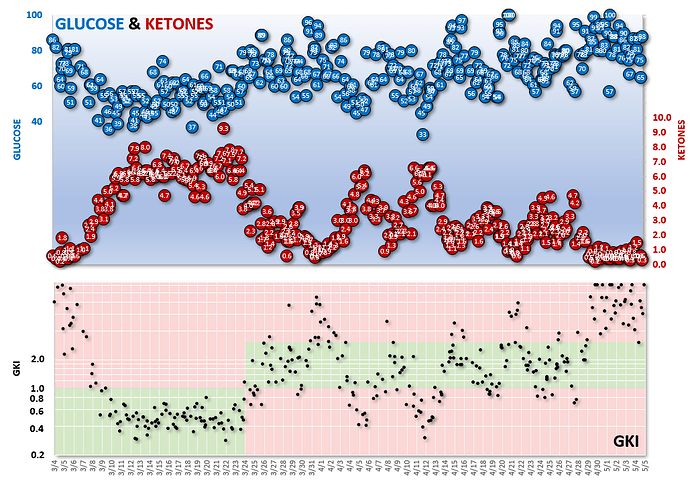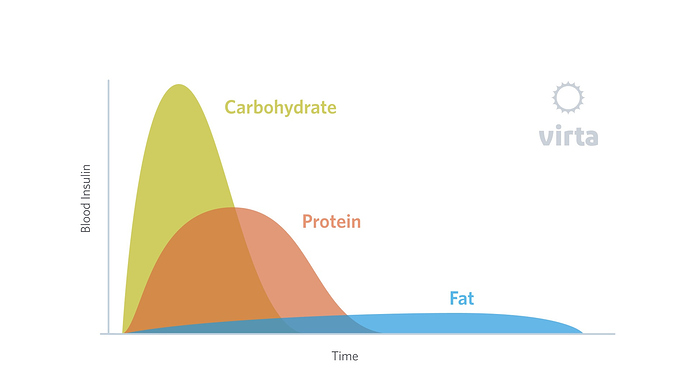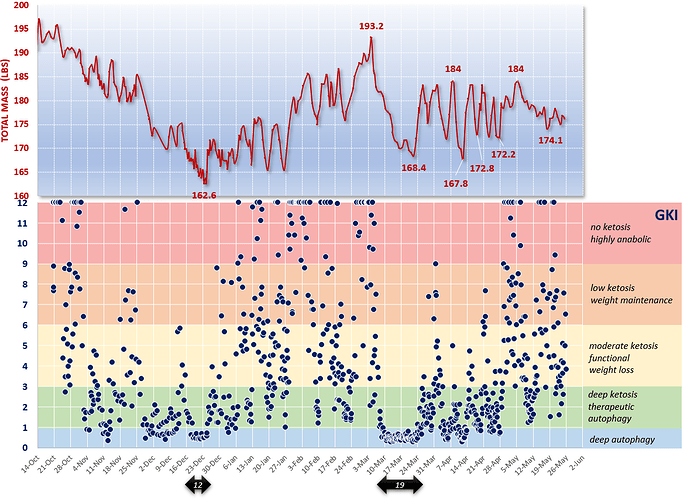That is not your baseline ketone level, it fluctuates just like glucose. Baseline is a fasted ketone reading not random noisy measurements post-pradial.
Dr. Darren Schmidt : Time To Update Your Keto Knowledge
I measure ketones 5 times a day every day. I’ve done so for about a couple of years now.
When I eat high levels of protein, even with low carbs, my ketones drop and glucose rises.
For example if were to run around the block a couple of times and take your blood ketones and blood glucose?
Guess what? The same thing will happen just like eating that steak?
But I didn’t run around the block. I sat at my computer and typed…
if I ate low protein… my ketones mildly drop … maybe from 1.5 to 1.3
if I ate high protein, my ketones crash… from 1.5 to 0.5 … glucose also rises much more
with the same activity… how is that?
I track the change in ketones with activity too and if I exercise, my ketones drop also.
Interestingly… a couple of hours after exercise and measuring, my ketones recover…
a couple of hours after eating high protein and measuring, my ketones do not recover…
Looking at those numbers, those are very insignificant fluctuations to even worry about?
really? insignificant to go from 1.5 to 0.5 and stay depressed?
I was using that as examples, but I’ve had drops from 4 to 1.5
it’s one thing to cite research, but this is my own data on my own experience…
This is even more intense when I account for GKI (the way Dr. Schmidt refers to it). I’ve seen increases from GKI that is sub 1 to over 4 … that’s significant.
Yes, but are you interpreting the data correctly?
You seem to have the mind set that higher ketones matter?
What if your ketones were above ten? Your blood would be so acidic that you would have a hard time breathing, that’s when your in trouble?
I’ve had ketones as high as 9.3. I’m not saying that’s better, but after fasting for 19 days continuously, it isn’t unusual. I was fine until I was at 8 because my glucose was very low. It was still low at 9.3, but I decided to break my fast at that point.
I am saying that ketones of 3.0 are better than ketones of 0.3 for fat loss… yes
At 3, there is a clear indication that the body is working on fat.
At 0.3, it means that it barely is using any fat.
I also have lab RMR data that shows my fat and sugar utilization when my ketones are high and it aligns also.
If your ketones are higher and your in a fasted state, then your not using them, all you have is blood with a higher acidic PH which IS NOT more beneficial.
of course I’m using ketones, there’s just an abundance above and beyond my usual consumption. The measurable blood ketones is a storage of energy to support me when I need. It’s akin to glycogen - stored energy in the body.
the body keeps my ketones higher because I would go lifting and it needed that abundance ready for use.
I was fasted for weeks… what else was I using? ketones… of course.
when I eat protein, there’s an abundance of glucose and my ketones drop because there’s no more need to use fat…
and protein has an insulin response
https://thestrongkitchen.com/blog/post/insulin-response-it-comes-from-eating-protein-too
it may be delayed and lower than carbs, but if you eat enough, the response is similar… for me, at least.
Yes their is an abundance but not significant enough to worry about as far as being of dangerous levels, so it looks good.
Hi Bunny. I know you’ll know the answer to this.
I’ve heard @richard explain it, but my brain is butter and the info doesn’t stick.
This doctor is explaining to get into ketosis to start and then reduce the intake of food fats so that body fat is used for energy. He is saying get the body fat adapted.
But I think there is a metabolic limit to how much energy can be drawn from body fat per day?
So that would mean, in a body fat loss plan there would be maths to do to work out optimising how much fat fuel energy will be drawn down from available body fat, and how much dietary fat will still be needed to maintain the balance of energy needs without stimulating a body hormonal stress response and overt Gluconeogenisis.
Are you able to tell me the limit of available metabolisable energy from body fat per day?
Not really a limit other than you want most of your calories coming from fat at all times 80% to 70% in ratio balance no matter what amount food your eating but not from protein or carbs.
With fat I usually just eye ball it, but you can look at how much fat is in any fatty foods per gram but after a while you kind of get a feel from hunger signals that you may just want to eat a little more fat if your in a carby mood and might lose control?
Dr. Phinney explains your question really well:
Is dietary fat burned before stored fat on a ketogenic diet?
By Dr. Stephen Phinney and the Virta Team
Certain fats, like medium-chain triglycerides found in coconut or MCT oil cannot be stored in body fat, so whatever is consumed must be promptly burned for energy. This means that if you’re adding these fats on top of your dietary fat consumption for satiety, this type of fat takes priority.
For regular dietary fats, once they are digested, they enter the circulation and participate in what is called ‘fatty acid turnover.’ Whether fed or fasted, the body is always releasing, burning, and storing fat. When insulin is high, storage predominates, but turnover continues. When insulin is low, release and oxidation predominate. If you eat fat along with a lot of carbohydrates, it is prone to be stored. When fat is consumed in the context of a well formulated ketogenic diet, it — along with fat released from adipose stores — is prone to be burned. But once digested and absorbed, dietary fat and stored fat enter the ‘turnover pool’ and are in a constant state of mixing. …More
Thanks Bunny.
@richard uses figures in the FAQs like the quote below that show there is a daily limit on the ability to draw energy from stored body fat. He also explained it really well in one of the podcasts. I’m just chasing the foundation physiological reference for that limited ability to access body fat for daily energy.
I remember that post from way back, that’s a really good way of looking at it!
https://www.ncbi.nlm.nih.gov/m/pubmed/15615615/
The upper limit in that paper of 290+25 = 315 kJ/kg per day = 34 cal/lb per day. This is the maximum fat transfer rate for highly fat adapted (post-fasting).
Can you remember the podcast where Richard explained it? So I can refresh my memory.
I think the ability to burn body fat for fuel is rate limited by the available fatty acid transportation in the blood stream?
Thanks Karim. Was that per total body weight? Or lean body mass? Or starting body fat mass? I imagine it’s per body weight. About 69 cal/kg? I’ll look more closely at the paper over coffee and omlette.
here’s my weight compared to GKI. GKI is Glucose/Ketone Index which is heavily a function of ketones
maybe I’m misinterpreting the results so I thought I’d share. Whenever my GKI is low (ketones are high), my weight drops. Whenever my GKI is high (ketones are low), my weight actually increases.
could be in my head, but I’ll open it up to anyone who sees a different pattern or relationship…
not only does it track, but it tracks continuously… when I fasted for a few days, and fed for 2 days… the cyclic GKI resulted in cyclic weight change too. When my GKI was consistently high, I gained consistently. When my GKI was consistently low, I lost consistently.
high ketones indicate that the body is ramping up fatty oxidation and even going into surplus energy preparation from fat. we shouldn’t chase ketones for the purpose of chasing ketones, but if you’re eating normal food (not ketones or MCTs), then the ketones do mean that you’re burning fat.
it is possible that the ketones are a product of dietary fat too, and that’s not useful for losing body fat. that’s a weakness in using the data. But if you’re a fat burner, your ketones will be high and GKI will be low. If you’re a sugar burner, your ketones will be low and GKI will be high.
It is possible to be “lean” and “in shape” and have low ketones… but if you’re trying to lose body fat and you have no or little ketones, then it’s not going to work.



